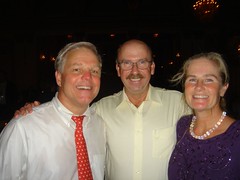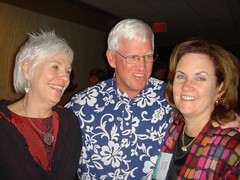I'm still digging out from last weekend, which I spent in Boston
celebrating my 25th reunion of my business school class. Friday night
we had dinner at the Top of the Hub in the Prudential Center with a
view of Fenway Park where the Red Sox were beating the Yankees.

At
HBS you spend your entire first year with your section of roughly 80
people, so the ties are strong. There was a lot of wry laughter about
those fanciful spreadsheet projections we had discussed five years ago
at our 20th in June of 2005. There was also a lot of wonder about the
change we've seen in 25 years and the change we were likely to see in
the next 25.
Over the years, it's been interesting to watch the
evolving conversations and concerns at each reunion.. In 1985, at our
5th reunion, we were pretty full of ourselves (Charlotte had a more
earthy way of putting it). As time has gone on, our conversations
and priorities have become much more focused on family and community.
Then, we all rushed off to hear about the latest new ideas and worked
the crowd. Last week, we blew off the lectures, sat outside on the
lawn on a gorgeous fall day, and walked to Harvard Square to grab ice
cream at Herrells.
Harvard sometimes has a reputation for
encouraging competition at the expense of cooperation; it certainly did
when I was there. On the other hand, you don't have to succumb to it. I
was in Section I and there used to be an apocryphal story of a comment
by the Dean that perhaps eight sections would be better for the school
than nine. As a group, we had a healthy skepticism about authority. I
do recall one thing we did as Section I that did earn us some trouble.
Histroically,
about 5% of the first year class at HBS flunks out–we called it
“hitting the screen.” In our section, we concluded that there was
no reason that any of those people had to come from our section. We set
up a voluntary lunch help session. If you were doing well in a course,
you'd hang out in the classroom to help out anyone else in the section
who felt they needed it. Sometimes I helped, sometimes I needed help.
While we did get some mild pressure from faculty to drop the idea, we
ignored them.
This last Saturday night, while there were a lot
of people still networking over cocktails, you could find the Section I
contingent on the dance floor and, a bit later, closing down the Oak
Bar at the Copley Plaza. A few more of us were drinking Diet Coke this
time than 25 years ago, but we still laugh at Bruce's jokes. And we're
still having fun.




